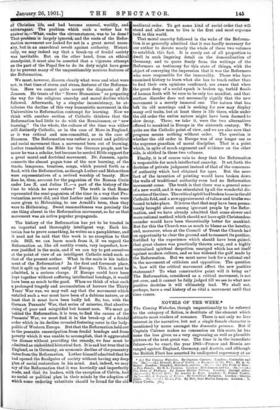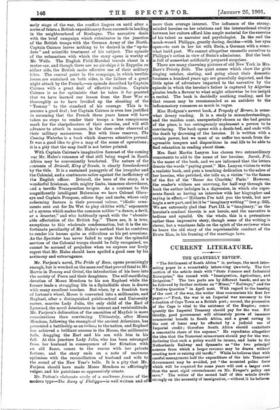NOVELS OF 1.11/4 WEEK.* The Coming Waterloo, though unquestionably to
be referred to the category of fiction, is destitute of the element which attracts most readers of romance. There is not only no love interest in the narrative, but not a single female character is mentioned by name amongst the dramatis persons. But if Captain Cairnes makes no concession on this score, he has none the less given us a very engrossing as well as plausible picture of the next great war. The time is in the immediate future—to be exact, the year 1903—France and Russia are ranged against England, Germany, and Austria, and although the British Fleet has asserted its undisputed supremacy at an • (1.) The Coming Waterloo. By Captain Cairnes. London : Constable and CO. [60.]—(2.) Driscoll, King of Scouts: a Romance of the War. By A. G. Hales. London : Bimpkin, Marshall, and Co. [6s.]—(3.) The Pride of Race : in Fire Panels. By B. L. Parjeon. London: Hutchinson and Co. [Se.]—(4.) The Stray of Philippe. By James Blythe Patton. London : George Allen. (E Is..1— ..)) TAriyAggetell:), By Amelia (EiraBigur. }fro:eon : Tiottolenr Unwir u. )illoli. , Gs.; —.(7.) Saeah, P.11. By . Sant krtin Li/yon. London; , k! Fisher unwin. Leis.3
early stage of the war, the conflict lingers on until after a series of feints a British expeditionary force succeeds in landing in the neighbourhood of Boulogne. The narrative deals with the brief campaign which culminates in the junction of the British troops with the German Army of the North. Captain Oairnes leaves nothing to be desired in the " up-to- date " and scientific treatment of his subject. The episode of the submarines with which the story opens is worthy of Mr. Wells. The English Field-Marshal travels about in a motor-car, and though there are no air-ships a /a Zeppelin on either side, the British make effective use of their military kites. The central point in the campaign, in which terrible losses are sustained on both sides, is the failure of a great night attack by the French,—an episode described by Captain Cairnes with a great deal of effective realism. Captain Cairnes is so far optimistic that he takes it for granted that we have learned our lesson from the Boer War so thoroughly as to have levelled up the shooting of the Tommy to the standard of his courage. This is to assume a good deal ; but Captain Cairnes is even less justified in assuming that the French three years hence will have taken no steps to render their troops a less conspicuous mark for the sharpshooters of their enemies, and will still advance to attack in masses, in the close order observed at their military manceuvres. But with these reserves, The Coming Waterloo is a book which deserves attentive perusal. It was a good idea to give a map of the scene of operations ; it is a pity that the map itself is not better printed.
With Captain Cairnes's imaginative forecast of the coming war Mr. Hales's romance of that still being waged in South Africa may be conveniently bracketed. The nature of the contents of Driscoll, Sing of Scouts, is clearly foreshadowed by the title. It is a sustained panegyric of the irregular and the Colonial, and a continuous satire against the inefficiency of the English officer. Driscoll, the hero of the story, is a wonderful Irishman, with mighty limbs, immense shrewdness, and a terrific Transpontine brogue. As a contrast to this magnificently intelligent Bohemian we have Colonel Glass- eye and Captain Pompom, odious fops and snobs, whose only redeeming feature is their personal valour, "idiotic orna- ments sent out for De Wet to play skittles with," exponents of a system which makes the common soldier "a dunce, a devil, or a deserter," and who habitually speak with the "abomin- able affectation of the British fop." There are, it is true, exceptions to this wholesale condemnation, but it is the un- fortunate peculiarity of Mr. Hales's method that he contrives to render his heroes quite as ridiculous as his pet aversions. As the Spectator has never failed to urge that the splendid services of the Colonial troops should be fully recognised, we cannot be accused of prejudice when we express our lively regret that Mr. Hales should have spoiled a good case by his acrimony and extravagance.
Mr. Farjeon's novel, The Pride of Race, opens promisingly enough, but is wrecked on the same reef that proved fatal to Mr. Barrie in Tommy and Grizel, the introduction of his hero into the society of Peers and their daughters. The self-sacrificing devotion of Moses Mendoza to his son Raphael while the former leads a struggling life in a Spitalfields slum is drawn with many excellent touches. But when, by a freakish turn of fortune's wheel, Moses is converted into a millionaire, and Raphael, after a distinguished public-school and University career, marries Lady Julia, the only child of the Earl of Lynwood, the novel deteriorates in interest and verisimilitude. Mr. Farjeon's delineation of the amenities of Mayfair is more conscientious than convincing. Ultimately, after Moses Mendoza, following the example of the ancient Athenians, has presented a battleship as an izfooarc to the nation, and Raphael has achieved a brilliant success in the House, the millionaire fails, dragging the Earl and his son with him in his fall. At this juncture Lady Julia, who has been estranged from her husband in consequence of her flirtation with an old flame, comes to the rescue with her private fortune, and the story ends on a note of unctuous optimism with the reconciliation of husband and wife to the sound of the New Year's bells. It is a pity that Mr. Farjeon should have made Moses Mendoza so affiictingly vulgar, and his patricians so oppressively ornate.
Mr. Patton's elaborate study of a maitresse femme of the modern type—The Sway of Philippa—is well written and of
more than average interest The influence of the strong.. minded heroine on her relations and the international rivalry between her suitors afford him ample material for the exercise
of his talent as narrator and psychologist. In the end the much-wooed Philippa, greatly daring, decides—with her eyes
open—to cast in her lot with Stein, a German with a some- what lurid past. We cannot altogether reconcile ourselves to Philippa's action in view of Stein's admissions. But the book is full of somewhat artificially prepared surprises.
There are many charming pictures of old New York in Mrs- Barr's Trinity Bells. The quiet scenes which show the girls singing catches, skating, and going about their domestic business a hundred years ago are gracefully depicted, and the little spice of adventure imparted to the narrative by the episode in which the heroine's father is captured by Algerine pirates lends a flavour to what might otherwise be too insipid a recital. The book is decidedly soothing reading, and for that reason may be recommended as an antidote to the inflammatory romances so much in vogue.
Miss Hodg,son's newest book, A Tragedy of Errors, is some- what dreary reading. It is a study in misunderstandings, and the maiden aunt, unexpectedly chosen as the bad genius of the piece, is too outrageously unpleasant a person to be convincing. The book opens with a death-bed, and ends with the death by drowning of the heroine. It is written with a certain power, but we most of us suffer too much from dis- agreeable tempers and dispositions in real life to be able to find relaxation in reading about them.
Mrs. Sant Martin Lanyon has chosen two extraordinary consonants to add to the name of her heroine. Sarah,. P.G. is the name of the book, and we are informed that the letters denote the words "paying guest." Mrs. Lanyon wishes to write a realistic book, and puts a touching dedication to the ashes of her heroine, who perished, she tells us, a victim "to the flames of the fire of the Bazar des Charites,' Paris." However, the reader's withers are unwrung, for half-way through the book the author indulges in a digression, in which she repre- sents Sarah as having an interview with her biographer and saying in effect= Hitherto I've told you the truth, but now begin a new part, and let it be " imaginary writing " ' (seep. 263). We are extremely glad that Part III. is "imaginary," as the heroine's conduct therein is not heroic, and the narrative is tedious and squalid. On the whole, this is a pretentious rather than impressive story, though some of the writing is clever, but a weariness falls on the spirit of the reviewer when he hears the old story of the reprehensible conduct of the Brute Man, in his framing of the marriage laws.



















































 Previous page
Previous page